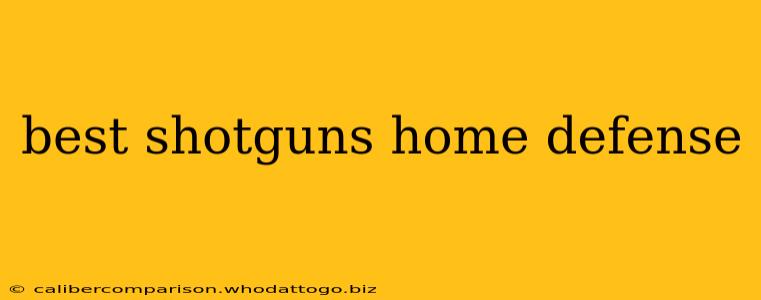Choosing the right home defense shotgun is a crucial decision, impacting your family's safety and security. This isn't a choice to be taken lightly. This guide will delve into the key factors to consider and highlight some top contenders, helping you make an informed decision based on your individual needs and preferences. We'll avoid specific model recommendations to avoid the ever-shifting landscape of product availability and pricing, but will focus on characteristics to look for.
Key Considerations for Choosing a Home Defense Shotgun
Before diving into specific features, let's outline the critical factors influencing your choice:
1. Gauge: 12 Gauge vs. 20 Gauge
The most common debate centers around gauge. 12 gauge shotguns are powerful and offer a wider variety of ammunition choices, including less-lethal options like beanbag rounds. However, they have a significant recoil, which can be challenging for less experienced shooters or those with physical limitations.
20 gauge shotguns offer a compromise. They are lighter, have less recoil, and are easier to handle, making them a good choice for smaller individuals or those new to firearms. While the power is slightly less than a 12 gauge, they're still more than sufficient for home defense purposes.
Ultimately, the best gauge depends on your physical capabilities and comfort level with recoil.
2. Action Type: Pump-Action vs. Semi-Automatic vs. Break-Action
Each action type presents advantages and disadvantages:
- Pump-action: Reliable, relatively inexpensive, and easy to maintain. The manual action reinforces a deliberate shot placement strategy.
- Semi-automatic: Faster follow-up shots, potentially advantageous in a high-stress situation. Requires more maintenance and can be more expensive. Reliability can vary based on manufacturer and model.
- Break-action: Simple, reliable, and often less expensive. However, they are significantly slower to reload.
3. Barrel Length and Choke
Barrel length affects maneuverability and recoil. Shorter barrels are easier to handle in tight spaces, while longer barrels generally offer slightly better accuracy and less recoil. The choke determines the shot pattern. A modified choke is generally recommended for home defense, offering a balance between pattern density and range. Avoid overly tight chokes designed for long-range hunting as they can lead to unpredictable patterns at close ranges.
4. Sights and Accessories
Consider the sight system. Ghost ring sights are excellent choices for quick target acquisition in low-light conditions. Accessories such as a tactical light or a forend grip can enhance usability and control. Think about your needs and the layout of your home when assessing what additional features are essential.
5. Ammunition Selection
Beyond the shotgun itself, ammunition is crucial. While buckshot is a common choice for home defense, 00 buck is generally preferred for its stopping power. Consider the potential for over-penetration, especially in densely populated areas. Less-lethal options like beanbag rounds are also available, offering a potential alternative in certain situations. Always practice with the type of ammunition you intend to use for home defense.
Choosing the Right Shotgun for You
The best shotgun for home defense is the one you can handle comfortably, shoot accurately, and are confident using under pressure. Prioritize proper training and regular practice. Familiarize yourself with your state's laws regarding firearms and home defense. Consider consulting with a firearms expert or instructor to get personalized guidance.
Disclaimer: This information is for educational purposes only and should not be considered professional advice. Always consult with relevant authorities and professionals before making decisions about firearms ownership and use.

